|
MGClassic
See Special Offers
|
MGHome Cellular
See Special Offers
|
MGMini
See Special Offers
|
MGMini Lite
See Special Offers
|
MGMove
See Special Offers
|
|
|---|---|---|---|---|---|
| Monthly fee | $33.95 | $38.95 | $43.95 | $48.95 | $43.95 |
| Device type | In-Home | In-Home | On-the-Go | On-the-Go | On-the-Go |
| Device range | 1,300 ft. | 1,400 ft. | Unlimited | Unlimited | Unlimited |
| Connection type | Landline | Wi-Fi and LTE | GPS, Wi-Fi, and LTE | GPS, Wi-Fi, and LTE | GPS, Wi-Fi, and LTE |
| Battery life | 32 hours with backup battery | 32 hours with backup battery | 5 days | 3 days | 24 hours |
| Location tracking | No | No | Yes | Yes | Yes |




